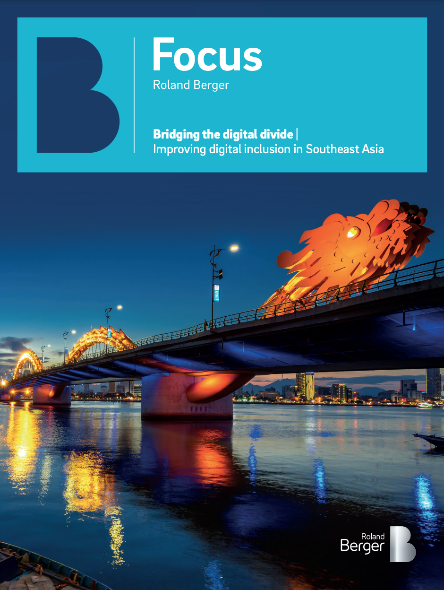Bridging the digital divide
![{[downloads[language].preview]}](https://www.rolandberger.com/publications/publication_image/Roland_Berger_STU_711_Digital_Inclusion_Cover_download_preview.png)
Fostering digital inclusion has become a critical priority for countries across the world to avoid falling behind in the digital race.


By Sulina Kaur, John Low and Damien Dujacquier
"Governments and societies must proactively become digital-ready to survive in the new normal"
Digitalization has profoundly affected the dynamics of global industries, patterns of economic development, and the functioning of people’s daily lives. As the use of Internet and information communications technology (ICT) expands across the globe and the digital sector outpaces growth in other sectors, digital technology has asserted itself a crucial component of successful participation in societal and economic activities. Roland Berger’s latest study, “Bridging the digital divide”, reveals that if countries do not address digital inclusion, economic growth could be reduced, and social cohesion could be weakened.
Digital inclusion is the empowerment of individuals and societies to effectively use ICT, enabling them to contribute to and benefit from today's digitalized economies and societies. It is crucial to create an equitable and sustainable digital society, and to facilitate both personal income growth and macro-economic development. However, according to a UN report in October 2019 , nearly half of the world's population remains offline and excluded from the benefits of digitalization. This growing "digital divide" negatively affects socio-economically disadvantaged individuals and groups, such as low-income households, rural communities, the elderly, the illiterate, persons with disabilities, as well as micro, small and medium enterprises (MSMEs).

The benefits of fostering digital inclusion, as found in the study, are manifold. Because ICT tools and digital skills provide new opportunities to increase revenues, labor productivity and employment, digital inclusion acts an economic enabler. Automation significantly increases the efficiency and performance of workforces, while online channels and digital transactions improve reach and access for individuals and businesses. Digital inclusion also acts as a social equalizer by democratizing education and ensuring diversity of opinion and consumer choice. Finally, with the use of e-government services and more inclusive digital platforms for essential services like healthcare, digital inclusion increases civic outreach, aiding the administration of good governance.
Since the onset of the Covid-19 pandemic, the need for greater digital inclusion has only become starker. The daily functioning of businesses, schools, retail, social interactions and the dissemination of government information has shifted to online modes. As such, those excluded from digital technologies have become more vulnerable to misinformation and the disease itself. Similarly, MSMEs caught unprepared for the rapid digital shift accelerated by Covid-19 were unable to execute effective business continuity plans or evolve their business models, leading to significant revenue losses and a severe unemployment crisis. The pandemic has taught us that we require a digital-ready society, which requires wider access to digital skills.
Roland Berger developed a Digital Inclusion Index (RB DII) in order to simplify the analysis of digital inclusiveness in countries. It is based off an assessment of 82 emerging and developed countries on four key levers: accessibility, affordability, ability and attitude. The analysis shows that all countries, except Sudan, saw an increase in their overall digital inclusion score between 2017 and 2020. Singapore maintained its position as the global leader, largely on account of programs like free public WiFi and financial assistance schemes for digital skills training. Sweden, Denmark, the Netherlands and the United States came in next, influenced by their high levels of English (the dominant language online), high GDP per capita, affordability of mobile plans, and strong e-government programs.
Myanmar, Vietnam and Egypt significantly improved accessibility by enhancing infrastructure in mobile data availability and coverage, and enhanced affordability through market competition between rival telcos. Southeast Asia, South America and Sub-Saharan Africa dominated the lower end of the list. However, an increased sense of trust and online safety through digital-friendly policies is leading developing nations in these regions to become more enthusiastic about ICT, which in turn fosters greater digital inclusion.
By understanding the relationships between the four levers and planning a holistic approach to improving digital inclusion, policy makers can make impactful and lasting change. Roland Berger developed a framework for improving digital inclusion on this basis, featuring seven key drivers.
When following this framework, governments must act first to identify needs and those lacking resources, and then enable or direct funding to where it is needed. By taking the role as chief initiator, governments can establish dedicated agencies to manage digital initiatives or push e-government programs. The private sector also plays a key role in supplying digital content and services to facilitate the provision of services to the public. Commercial players offer expertise, efficiencies and network infrastructure to public programs and they reduce the costs by sharing resources. Ultimately, digital inclusion is a critical priority for countries across the world and both the private and public sector should strive to address it together. They must do so urgently to avoid falling further behind in the digital race.

![{[downloads[language].preview]}](https://www.rolandberger.com/publications/publication_image/Roland_Berger_STU_711_Digital_Inclusion_Cover_download_preview.png)
Fostering digital inclusion has become a critical priority for countries across the world to avoid falling behind in the digital race.

